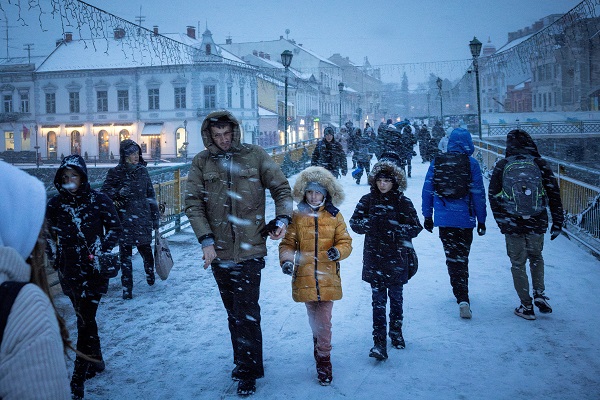 People walk on a snowy day in Uzhhorod which has a sizeable minority of ethnic Hungarians, amid Russia's attack on Ukraine, in Zakarpattia region, Ukraine, 30 November 2023;
Credit: Reuters/Thomas Peter
People walk on a snowy day in Uzhhorod which has a sizeable minority of ethnic Hungarians, amid Russia's attack on Ukraine, in Zakarpattia region, Ukraine, 30 November 2023;
Credit: Reuters/Thomas Peter
UZHHOROD, Ukraine (Reuters) - Hungarian Prime Minister Viktor Orban says he will block Kyiv's bid to start membership talks with the European Union, citing corruption and the denial of the rights of tens of thousands of his ethnic kin living in western Ukraine.
For some Hungarians in the mountainous region of Zakarpattia, his arguments ring hollow.
"We represent the face of the Hungarian community, which like all Ukrainian citizens, is fighting for European values," said Fedir Shandor, one of the best-known representatives of the ethnic Hungarian community in Ukraine.
Shandor, a professor at Uzhhorod National University, said nearly 400 ethnic Hungarians were serving in the Ukrainian armed forces, fighting against Russia which launched its full-scale invasion in February 2022. He volunteered early in the war.
Hungarian civil organisations and mayors of some cities sent shipments of drones, warm clothes and other equipment worth nearly $3 million, Shandor added.
Orban, meanwhile, boasts of his ties with Russian President Vladimir Putin.
So while debate over which languages ethnic minorities can speak in Ukrainian schools continues, and thousands of Hungarians have left to seek a new life elsewhere, many of those who remain favour a future in Europe alongside Hungary.
This week, several leaders of the Hungarian community in Ukraine sent a letter to Orban and European Council chief Charles Michel calling for support for Kyiv's EU accession.
President Volodymyr Zelensky also spoke briefly with Orban this month during the inauguration of Argentine President Javier Milei, and went on to Washington for talks with US President Joe Biden and other political leaders.
The sense of urgency has grown ahead of a EU summit on 14 and 15 December 2023 at which Orban has threatened to veto proposals to allow Kyiv to start talks to accede the bloc and to receive substantial financial and military aid.
Ukraine is desperate to join the EU as it seeks to break links with Russia and build alliances with the West, while €50 billion of economic support and €20 billion for its military would be key to funding the war.
Language tensions
Relations between Kyiv and Budapest became strained after Ukraine passed a law in 2017 that required all schools to teach students over the age of ten in the Ukrainian language. Local Hungarians complained, saying it was a breach of their rights.
"For the most part, I share the opinion of the Hungarian community, which wants to learn in its native language at all stages of education," said Attyla Kopryva, a 52-year-old artist and professor at Zakarpattia Arts Academy.
"You can teach people to love learning the Ukrainian language, or you can force people to learn the Ukrainian language," he added, switching between Ukrainian and Hungarian in his home studio in Mukachevo, a town about 50 km from the border with Hungary and Slovakia. "This issue is very delicate."
As it drives reforms to meet the EU's criteria, Ukraine passed updated legislation this month on minority rights and allowing the use of the EU languages, including Hungarian, in private schools, universities, media and other spheres.
The Hungarian community leaders welcomed the law in their letter, adding that they hoped it would be properly implemented.
"We are certain that the long-awaited law will enable the Hungarian community to preserve its native language, heritage and traditions," said Zoltan Babjak, mayor of Berehove, a town with a large Hungarian majority where Ukrainian, Hungarian and EU flags fly over the city council.
War and exodus
Zarkapattia's governor, Viktor Mykyta, told Reuters that the region had undergone huge demographic changes in recent years, particularly since Russia launched its invasion.
Many Ukrainians from the east and south of the country saw Zakarpattia, which had no curfew and rarely comes under attack from Russian missiles, as a safe haven and so moved there.
According to Mykyta, between 300,000 and 350,000 people settled in bigger towns including the medieval regional centre of Uzhhorod, raising the region's population by about a third.
Meanwhile many ethnic Hungarians, especially women, children and young people, have left. Once close to 150,000, the community is now about 80,000, officials said. They did not specify a timeframe for the exodus, which has been happening for several years.
Some villages where ethnic Hungarians made up the majority - like Velyka Dobron or Dercen - emptied.
A school official in Velyka Dobron, with a pre-war population of some 5,000 people, said a local Hungarian-language school had ten fewer classes this year compared with the previous year.
In Uzhhorod, the situation is similar.
"Many left," said Viktor Opalenyk, a 31- year-old ethnic Hungarian tour guide from the city.
"My classmates with whom I studied at a Hungarian school, a good 30-40% of them are in Hungary now and the rest somewhere in Europe," he told Reuters, sitting in a coffee bar in the heart of Uzhhorod. "Only those who were integrated into the Ukrainian context remained."








